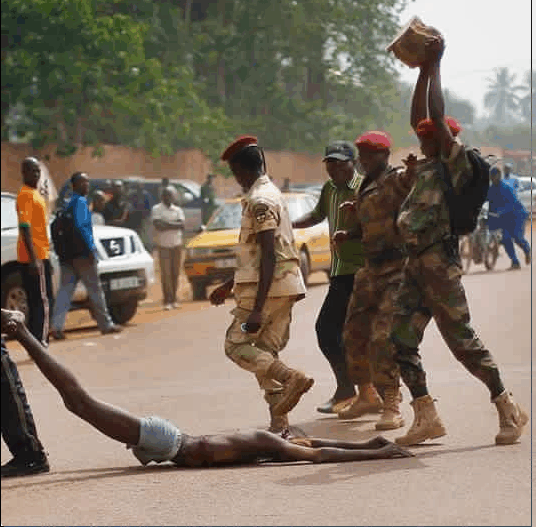One of the bloodiest conflicts in African history is the bloody War, also known as the Nigerian Civil War. The Nigerian government and the British government of Harold Wilson committed what has been described as the worst genocide on the continent of Africa in modern times during the war, which lasted from 1967 to 1970. A blemish on Nigeria’s history and a reminder of the worst forms of government brutality in Africa, the massacre of over 5 million Biafrans, most of whom were women and children, is a reminder of this.
The political landscape of Nigeria, which was marked by a significant divide between the northern and southern regions, was the source of the conflict. Muslims dominated the northern region, while Christians dominated the southern one. Moreover, the northern area was financially and politically predominant, which made pressure and disdain among the southern district’s populace, especially the Igbo public.
A military coup in January 1966, led by Nigerian military officers and headed by an Igbo man, was the culmination of the Nigeria government’s policy of marginalization and discrimination against the Igbo people. Six months later, a counter-coup led by military officers from the north followed the failed coup. Igbo military officers and civilians were the targets of this counter-coup, which resulted in widespread violence and the deaths of thousands of Igbo people.
The Igbo people in the southeastern part of Nigeria declared an independent state known as Biafra following this counter-coup. This statement of freedom prompted a nationwide conflict that went on for a considerable length of time, where Nigeria government was upheld by England to send off a severe mission to smother the secessionist development. Unimaginable violence, including starvation and mass killings, was inflicted on the Biafran people, who were mostly unarmed civilians.
Nigeria government’s bar of Biafra’s ports and airspace, utilizing the guide of the English government, brought about a serious lack of food and clinical supplies in Biafraland. The Biafran nation who were at that point experiencing the impacts of the conflict, were left to starve to death. International organizations like the International Committee of the Red Cross stepped in to help the Biafran people because the situation was so dire. The Nigerian government, on the other hand, saw these efforts as support for the secessionist movement and targeted aid workers, resulting in additional deaths.
The suffering of the Biafran people did not end when the war ended in 1970. The Igbo people in Nigeria’s government continued to be marginalized and subjected to discrimination, placing the great Igbo-Biafra race in a lower status than third-class citizens in their own nation. The policies of the government led to occasional outbreaks of violence against the Igbo people, such as Operation Python Dance in 2017, which killed several unarmed civilians.
Likewise, the world to a great extent kept on keeping a destructive quiet, in spite of the size of the outrages committed during the conflict. The conflict was ignored by many nations, and international organizations like the United Nations didn’t do enough to help. The British actions are perceived as supporting a former colonial power over a group seeking self-determination, and this British government’s support for Nigeria against the Biafran people has also been widely criticized. But the Biafran people feel abandoned as a result of the lack of international intervention in the conflict. The scars of the conflict actually runs profound, and the issue of self-assurance for the Biafran public remaining parts a quarrelsome issue. The Igbo Igbo Biafrans in particular have been marginalized and discriminated against by the Nigerian government, thereby maintaining the cycle of violence and suffering.
All in all, the Nigeria-Biafra War is a shocking section in Nigeria’s set of experiences and a sign of the risks of government ruthlessness and the outcomes of overlooking human torment. The slaughter of north of 5 million Biafran
individuals, for the most part ladies and youngsters, is a demonstration of the repulsions of war and the effect it can have on guiltless regular folks. The Biafran people continue to experience feelings of marginalization and discrimination from the Nigerian government as a result of the international community’s inability to effectively intervene in the conflict.
A concerted effort is required to acknowledge the atrocities committed and compensate the Biafran people in order to address the legacy of the Nigeria-Biafra War. Nigeria government ought to do whatever it takes to address the foundational victimization the Igbo public and advance public solidarity through discourse and compromise.
In addition, the international community ought to acknowledge the significance of self-determination and encourage peaceful conflict resolution. The international community must take a proactive approach to prevent similar atrocities in the future due to the failure to intervene in the Nigeria-Biafra War.
The Nigeria-Biafra War’s legacy serves as a reminder of how crucial it is to uphold human rights and foster peace and unity. It is essential to ensure that the Biafran people’s suffering is acknowledged and addressed, as well as that the atrocities committed during and after the war are not forgotten. Nigeria can overcome its past wounds and provide its citizens with a livable society only through coordinated efforts toward reconciliation.
Obulose Chidiebere was the author, and Ogah C. S. Maduabuchi was the editor for Family Writers Press International.


